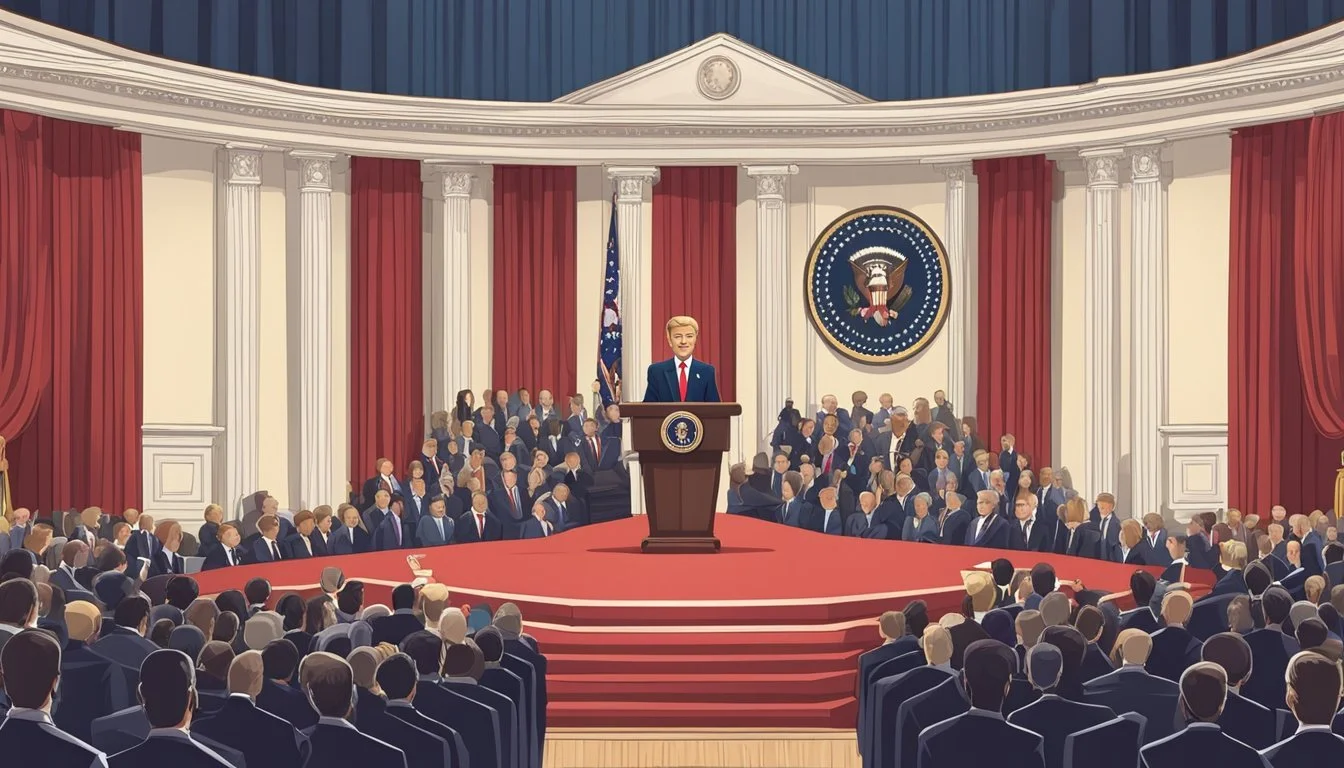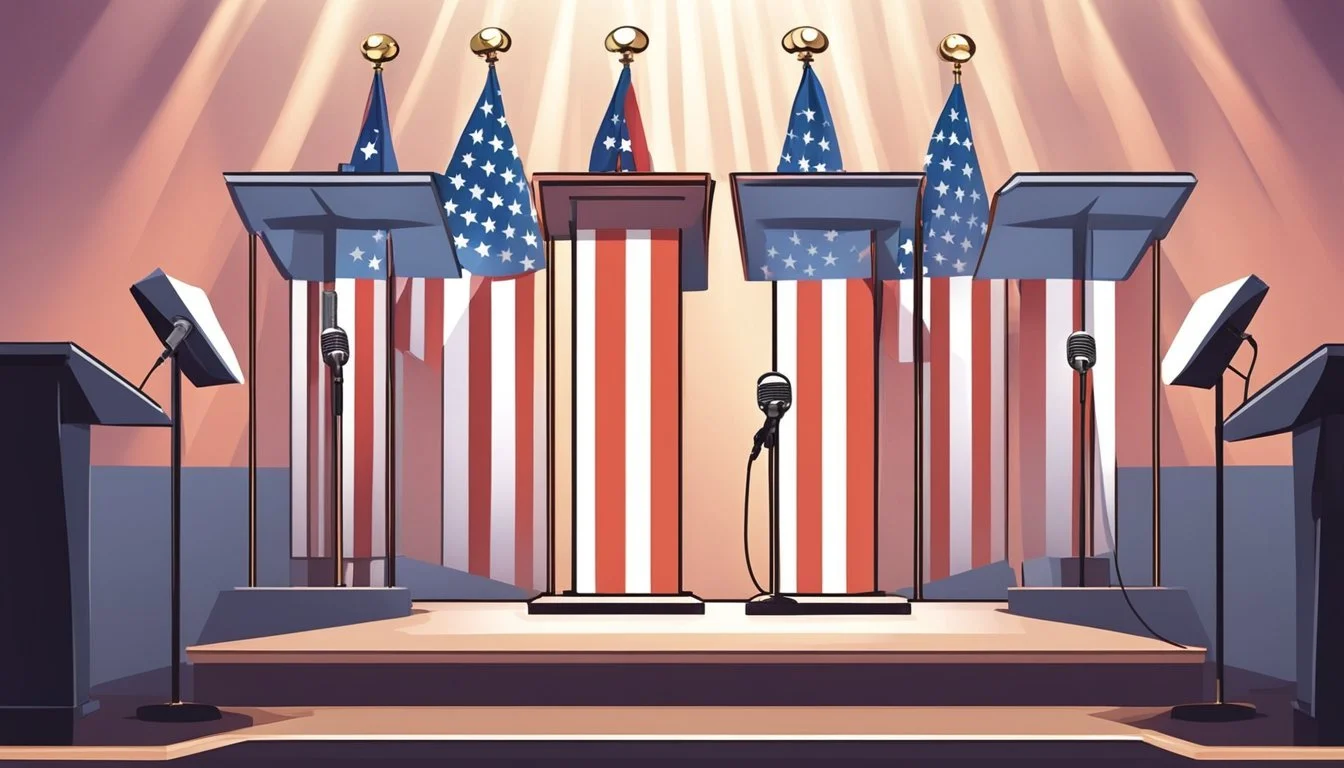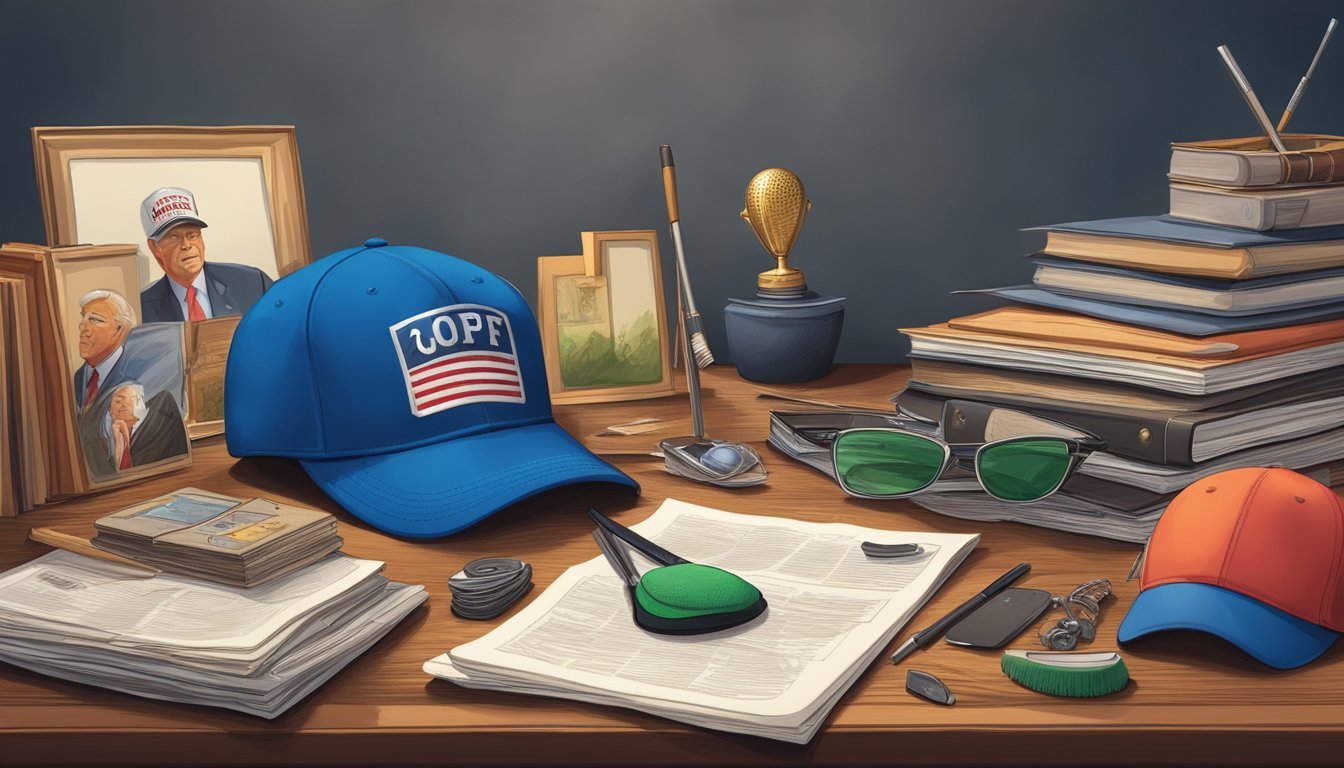Uncovering the Personal History of Donald Trump
From Real Estate Mogul to President
Donald Trump, born on June 14, 1946, in New York City, is a prominent figure in American politics and business. He served as the 45th President of the United States from 2017 to 2021, marking a significant shift in the country's political landscape. Trump's journey to the White House began with his background in real estate and reality television, which helped shape his public persona.
Trump's family history is rooted in immigration. His paternal grandparents were German immigrants, while his maternal grandparents hailed from Scotland. This diverse heritage influenced his upbringing in Queens, New York, where he was raised in a wealthy family led by his father, Fred Trump, a successful real estate developer.
Before entering politics, Trump built a reputation as a businessman and media personality. He took over his father's real estate company in 1971, expanding its operations and making a name for himself in Manhattan's competitive property market. His ventures extended beyond real estate to include entertainment, with his role as host of the reality TV show "The Apprentice" further cementing his status as a household name.
Early Life and Education
Donald Trump's early years were shaped by his family background, education, and experiences in New York. His journey from Queens to prestigious institutions laid the foundation for his later business and political career.
Birth and Family Background
Donald John Trump was born on June 14, 1946, in Queens, New York. He was the fourth of five children born to Frederick Christ Trump Sr. and Mary Anne MacLeod Trump. His father was a successful real estate developer, which would later influence Donald's career path.
The Trump family lived in Jamaica Estates, a wealthy neighborhood in Queens. Donald grew up in a 23-room house, experiencing a privileged upbringing that contrasted with the working-class areas nearby.
Education Journey
Trump began his education at the Kew-Forest School in Forest Hills, Queens. He attended this private school until seventh grade. Due to behavioral issues, his parents decided to enroll him in a more structured environment.
At age 13, Trump was sent to the New York Military Academy (NYMA) in Cornwall-on-Hudson. This decision aimed to instill discipline and focus in the young Trump.
Military Academy and Higher Education
At NYMA, Trump excelled in athletics and academics. He graduated in 1964 as a cadet captain. After NYMA, Trump enrolled at Fordham University in the Bronx, where he studied for two years.
In 1966, Trump transferred to the Wharton School of Finance at the University of Pennsylvania. He chose Wharton for its reputation in real estate studies. Trump graduated in 1968 with a Bachelor of Science degree in economics.
During his college years, Trump obtained student deferments from the Vietnam War draft. He later received a medical deferment due to bone spurs in his heels.
Business Career
Donald Trump's business career spans decades and encompasses real estate development, casinos, hotels, branding, media ventures, and financial ups and downs. His aggressive deal-making and high-profile projects made him a prominent figure in American business.
Real Estate Development
Trump joined his father's real estate company in the late 1960s. He renamed it the Trump Organization and shifted focus to Manhattan. In 1978, Trump's first major project was renovating the Commodore Hotel into the Grand Hyatt. His most famous development, Trump Tower, opened in 1983 on Fifth Avenue. The 58-story skyscraper became Trump's primary residence and headquarters.
Other notable New York properties included:
Trump Plaza
Trump Parc
40 Wall Street
Trump expanded to other cities, developing Trump International Hotel and Tower in Chicago and Trump International Hotel in Las Vegas.
Expansion into Casinos and Hotels
In the 1980s, Trump entered the casino business in Atlantic City. He acquired and developed:
Trump Plaza Hotel and Casino (1984)
Trump's Castle (1985)
Trump Taj Mahal (1990)
Trump also purchased the Plaza Hotel in New York City in 1988 for $407 million. He sold it in 1995. His foray into the casino industry was marked by initial success followed by financial difficulties.
Branding and Licensing
Trump leveraged his name as a brand, licensing it to various products and properties. This strategy allowed expansion with minimal investment. Trump-branded items included:
Steaks
Vodka
Water
Menswear
Furniture
He also licensed his name to real estate developments worldwide, including hotels, condominiums, and golf courses. This approach generated revenue through licensing fees without the risks of direct ownership.
Publications and Media Presence
Trump co-authored several books, most notably "Trump: The Art of the Deal" in 1987. The book was a bestseller and boosted his public profile. Other titles included:
"Trump: Surviving at the Top" (1990)
"Trump: The Art of the Comeback" (1997)
"Trump: How to Get Rich" (2004)
His media presence expanded significantly with the reality TV show "The Apprentice" in 2004. Trump hosted the show for 14 seasons, popularizing his catchphrase "You're fired!" This further cemented his status as a celebrity businessman.
Financial Challenges and Bankruptcies
Despite his image of success, Trump's businesses faced significant financial challenges. His companies filed for bankruptcy protection six times:
Trump Taj Mahal (1991)
Trump Plaza Hotel (1992)
Trump Hotels and Casino Resorts (2004)
Trump Entertainment Resorts (2009)
These bankruptcies were primarily related to his casino operations. Trump maintained that he used bankruptcy laws strategically to negotiate better deals. Critics argued these failures contradicted his self-proclaimed business acumen.
Trump's net worth has been a subject of debate. Forbes and other sources have often provided lower estimates than Trump's own claims. Financial ups and downs marked his career, with periods of reported losses and recoveries.
Public Persona and Media
Donald Trump's public image has been shaped significantly by his involvement in television, social media, and published works. His carefully crafted persona as a successful businessman and celebrity has played a crucial role in his political career.
Television and Entertainment
Trump's television career began with cameo appearances in films and TV shows in the 1980s and 1990s. His breakthrough came with "The Apprentice" in 2004, where he portrayed a stern but charismatic business mogul. The show ran for 14 seasons, with Trump as the central figure.
"The Apprentice" catchphrase "You're fired!" became synonymous with Trump's public image. The program showcased his luxury lifestyle and business acumen, significantly boosting his celebrity status.
Trump also appeared on WWE wrestling programs, further expanding his reach to diverse audiences. These appearances reinforced his image as a bold, outspoken figure in popular culture.
Social Media Influence
Twitter became Trump's primary platform for direct communication with the public. He joined the platform in 2009 and quickly amassed a massive following.
Trump's tweets often made headlines, driving news cycles and shaping public discourse. His unfiltered communication style resonated with supporters who viewed it as authentic and direct.
He used Twitter to announce policies, criticize opponents, and share personal opinions. This approach bypassed traditional media channels, allowing Trump to control his narrative.
Trump's social media presence extended to other platforms like Facebook and Instagram, further amplifying his messages and maintaining a constant public presence.
Published Works and Branding
"The Art of the Deal," published in 1987, established Trump as a business guru. The book, co-written with Tony Schwartz, became a bestseller and solidified Trump's reputation as a savvy dealmaker.
Trump's name became a brand, appearing on various products and properties. Trump-branded items included steaks, water, and a short-lived airline.
He authored several other books on business and politics, including "Trump: The Art of the Comeback" and "Crippled America." These works further reinforced his public image as a successful entrepreneur and political outsider.
Trump's branding efforts extended to real estate, with numerous properties bearing his name. This strategy helped maintain his public visibility and reinforced his image of wealth and success.
Political Career
Donald Trump's political career marked a dramatic shift from business to the highest office in the United States. His unconventional approach and controversial policies defined his time in politics.
2016 Presidential Campaign
Trump announced his candidacy for president in June 2015, running as a Republican. His campaign slogan "Make America Great Again" resonated with many voters. Trump's unorthodox style and populist message set him apart from traditional politicians.
He defeated 16 other Republican candidates in the primaries. In the general election, Trump faced Democratic nominee Hillary Clinton. Despite losing the popular vote, Trump won the Electoral College, securing 304 electoral votes to Clinton's 227.
Trump's victory shocked many political observers and pollsters who had predicted a Clinton win. His campaign focused on issues like immigration, trade, and economic revitalization for the working class.
Tenure as the 45th President
Trump took office on January 20, 2017. His presidency was marked by significant policy changes and a combative relationship with the media and political opponents.
Key actions included:
Tax cuts and deregulation
Strict immigration policies
Withdrawal from international agreements
Conservative judicial appointments
Trump's communication style, often via Twitter, broke from traditional presidential norms. His "America First" foreign policy altered many longstanding U.S. alliances and trade relationships.
Impeachment Proceedings
Trump faced impeachment twice during his presidency, a unique occurrence in U.S. history. The House of Representatives impeached him in December 2019 for abuse of power and obstruction of Congress.
The charges stemmed from allegations that Trump pressured Ukraine to investigate his political rival, Joe Biden. The Senate acquitted Trump in February 2020, with all but one Republican voting against conviction.
A second impeachment occurred in January 2021, following the Capitol riot on January 6. The House charged Trump with incitement of insurrection. He was acquitted again by the Senate after leaving office.
2020 Presidential Election and Aftermath
Trump ran for reelection in 2020, facing Democratic nominee Joe Biden. The COVID-19 pandemic significantly impacted the campaign and voting processes.
Biden won both the popular vote and the Electoral College. Trump disputed the results, claiming widespread voter fraud without substantial evidence. His legal team filed numerous lawsuits, nearly all of which were dismissed or withdrawn.
Trump's refusal to concede and his rhetoric led to the January 6, 2021 Capitol riot. Supporters stormed the U.S. Capitol in an attempt to overturn the election results. This event deeply divided the nation and led to Trump's second impeachment.
Controversies and Legal Issues
Donald Trump's presidency and business career have been marked by numerous controversies and legal challenges. These range from personal conduct allegations to political scandals and formal investigations.
Personal Conduct and Allegations
Trump has faced multiple accusations of sexual misconduct. Over 20 women have publicly accused him of inappropriate behavior, including unwanted touching and assault. One high-profile case involved writer E. Jean Carroll, who alleged Trump sexually assaulted her in the 1990s.
Trump has consistently denied all allegations. He has often characterized the accusations as politically motivated attacks.
The Access Hollywood tape, released in 2016, sparked significant controversy. In the recording, Trump was heard making lewd comments about women.
Business Investigations
Trump's business practices have come under scrutiny. The Trump Organization faced a civil fraud lawsuit filed by the New York Attorney General in 2022.
Investigators alleged the company inflated asset values to obtain loans and deflated them for tax purposes. Trump denied any wrongdoing and claimed the investigation was politically motivated.
The Trump Foundation, his charitable organization, was dissolved in 2018 following allegations of misuse of funds. Trump agreed to pay $2 million to settle claims that the foundation improperly used donations for his presidential campaign.
Political Scandals
The Russia investigation, led by Special Counsel Robert Mueller, examined potential links between the Trump campaign and Russian interference in the 2016 election. While the investigation did not establish criminal conspiracy, it did not exonerate Trump on obstruction of justice.
The Ukraine scandal led to Trump's first impeachment. He was accused of pressuring Ukraine's president to investigate political rival Joe Biden in exchange for military aid.
Questions about Trump's tax returns and potential conflicts of interest persisted throughout his presidency. He broke with tradition by not releasing his tax returns while in office.
Impeachment Trials
Trump became the first president to be impeached twice. The first impeachment in 2019 centered on the Ukraine scandal. The House charged him with abuse of power and obstruction of Congress.
The Senate acquitted Trump in February 2020. The vote largely fell along party lines.
His second impeachment came in January 2021, following the January 6 Capitol riot. The House charged Trump with incitement of insurrection. He was accused of encouraging his supporters to storm the Capitol to disrupt the certification of Joe Biden's electoral victory.
The Senate trial took place after Trump left office. He was acquitted, though seven Republican senators voted to convict.
Personal Life
Donald Trump's personal life has been marked by multiple marriages, high-profile relationships, and a large family. He has cultivated a lavish lifestyle and pursued various business and recreational interests throughout his life.
Marriages and Family
Donald Trump has been married three times. His first wife was Ivana Trump, with whom he had three children: Donald Jr., Ivanka, and Eric. The couple divorced in 1992.
Trump married actress Marla Maples in 1993. They had one daughter, Tiffany, before divorcing in 1999.
In 2005, Trump wed Slovenian model Melania Knauss. Their son, Barron, was born in 2006.
Trump's adult children have played significant roles in his business empire and political career. Donald Jr. and Eric have managed Trump Organization properties, while Ivanka has served as an executive and advisor.
Lifestyle and Interests
Trump is known for his opulent lifestyle and luxurious properties. He has owned multiple residences, including Trump Tower in New York City and Mar-a-Lago in Florida.
Golf has been a longtime passion for Trump. He owns numerous golf courses worldwide and has frequently played the sport throughout his business and political career.
Trump's interest in entertainment led to his role as host of "The Apprentice" reality TV show from 2004 to 2015. This venture significantly boosted his public profile.
He has also shown a keen interest in branding, lending his name to various products and properties over the years.
Legacy and Influence
Donald Trump's tenure as the 45th President of the United States left an indelible mark on American politics, business, and culture. His unconventional approach and controversial policies sparked intense debates and reshaped public discourse.
Impact on Politics
Trump's "Make America Great Again" slogan galvanized a passionate base of supporters. His presidency shifted the Republican Party's focus towards populist and nationalist ideologies. Trump's use of social media, particularly Twitter, revolutionized political communication.
He appointed three Supreme Court justices, significantly influencing the judicial landscape. Trump's America First foreign policy altered international relationships and trade agreements. His claims of election fraud in 2020 continue to impact voter confidence and election processes.
Business Acumen and Public Image
Trump's transition from billionaire businessman to politician redefined expectations for presidential candidates. His net worth fluctuated during his presidency, with estimates varying widely.
Trump's business background influenced his approach to governance, emphasizing deregulation and tax cuts. His frequent promotion of Trump-branded properties while in office raised ethical concerns.
The Trump Organization faced increased scrutiny during and after his presidency. His image as a successful entrepreneur remained a key part of his political persona.
Cultural and Social Influence
Trump's presidency polarized American society, intensifying existing cultural divides. His rhetoric and policies on immigration, race, and gender sparked nationwide protests and debates.
Trump's influence extended to entertainment, with his past as a reality TV star shaping his public persona. His use of nicknames for opponents and catchphrases entered popular culture.
Social media platforms' decisions to ban Trump after the January 6 Capitol riot highlighted tensions between free speech and platform responsibility. His style of communication continues to influence political discourse.



